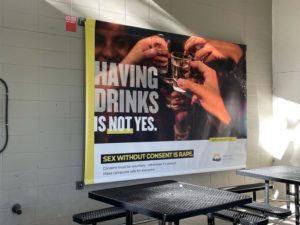The provincial government recently relaunched a campaign to raise awareness about sexual violence on campus.
The Is Not Yes campaign originally ran in 2019 and 2020; this time around, the government is aiming to reach more students through a larger on-campus and online presence. Parliamentary secretary for gender equity Grace Lore says that most on-campus sexual assaults happen early in the year.
“One of the things that we are seeing is that sexual assault actually seems to increase year after year; it is one of the few violent crimes that seems to rise,” says Lore. “We also know that young women are disproportionately going to experience sexual violence. Young women under 25 make up half of the sexual assaults reported to the police, and so we have students coming back to the campus, many for the first time in a year and a half, most of those sexual assaults occur in the first few weeks of a term, so it’s really important for us to have campus be the place for opportunities—their studies and their friendships, their lives free of harassment and violence.”

Lore’s main focus of the campaign is that it reach everyone.
“This campaign is really about meeting students where they’re at, and talking about what is and what isn’t consent. That is the real push behind the campaign; the real reason why it is so important for us to do,” she says. “That is why the campaign is called Is Not Yes. It really focuses strongly on what consent isn’t. Consent is the only thing that is ‘yes.’ Flirting is not ‘yes.’ Drinking is not ‘yes.’ A second or third date is not ‘yes.’ So as long as students get their information, whether through print or social media, as long as it’s in front of them, it can start these conversations, real conversations about consent.”
Lore says the campaign may have been more difficult to launch with so much focus on the COVID-19 pandemic, but the rates of sexual violence continue to rise, and people are listening.
“I think that it has been true throughout the world now for the last year and a half, but at the same time, with returning to campus, we are hearing anecdotal evidence from sexual-assault centres that there is an increase in sexual violence since opening up. We know that COVID has opened up a shadow pandemic of increased gender-based violence, so it is really important, maybe more important than ever, to have this campaign, and to have it in front of students at the start of term.”
Lore stresses that survivors of sexual violence are not alone, and urges them to call Victim Link or reach out to the Victoria Sexual Assault Centre.
“Part of the challenge is the fact that it is so under-reported,” says Lore.
Lore says that she would really like to stress that only yes means yes.
“Two-thirds of sexual assaults happen in the first few weeks of school, and now with students coming back to campus after such a long break, and since two-thirds of the assaults happen in the first few weeks on campus, we need to be especially talking about this now as we get back to school this year,” she says. “What we really need to push behind this campaign is to be very clear about what consent looks like, but we also need to be very explicit about what is not consent. The campaign makes it incredibly clear that drinking is not yes, flirting is not yes, walking someone home is not yes; all of this is really important and I am hoping that the students will take the time to share some of the visuals through social media and for everyone to be part of that conversation.”
